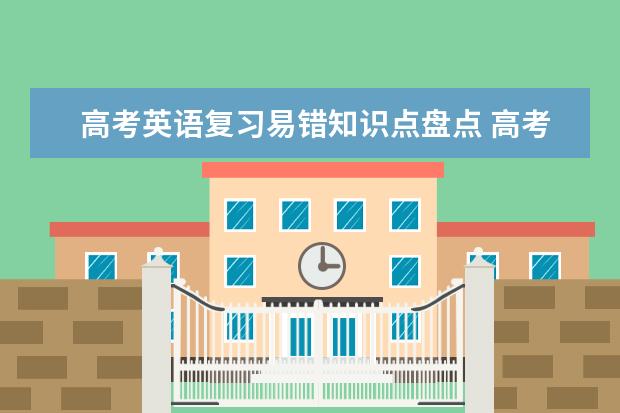今天天天高考网小编整理了高考英语复习易错知识点盘点 届高考英语仿真模拟试题附答案相关信息,希望在这方面能够更好的帮助到考生及家长。
高考英语复习易错知识点盘点
高考英语复习易错知识点盘点
高三学生在复习应考时存在的最主要的问题是心态问题。进入高三阶段,最主要的是调整好心态,对每一次测试与模拟考试都要认真准备和应考。良好的心态可以保证考试中正常甚至超水平发挥。在高三阶段,考生一定要认识到复习的过程最重要,而不要太在意每次考试的结果。一般而言,考生在高三复习应考阶段主要存在以下几个问题。
一、考前心理焦虑问题
考生在高三阶段难免有不安和烦躁的心情,一旦出现这些情况要及时采取有效措施予以纾缓。如可以采取走出教室散散步,看看一些感兴趣的杂志或找一些自己的好友知己聊聊天等方法使自己的不安和烦躁的心情慢慢地平和下来,缓解考前焦虑的心情。
作为高三学生一定要用平和心态去复习应考,注意劳逸结合,艰苦的学习之余一定要进行适当的锻炼。在高三复习应考阶段,尤其要做到生活起居有规律,坚持做到学习的时候一定要认真学习,讲究学习效率,该玩的时候记住要痛痛快快地玩。
二、不理性地狂做习题的问题
进入高三复习应考阶段,大部分考生由于基础知识不扎实,焦虑心理随之而来,为了恶补以前欠下的学习任务,获取一个比较理想的成绩,昏天黑夜地狂做习题,但结果却往往事与愿违。实际上,这一阶段的主要任务是梳理知识,这种梳理需要考生以理性来进行控制和操作。
首先考生在课堂上一定要认真仔细听老师讲课,及时记下所有对自己有用的东西,课后要认真整理听课笔记。最好准备一个错题本,考前认真浏览一遍,可以减少自己重犯之前错误的可能。高三复习应考阶段,考生应该有针对性地做题,比如针对自己的薄弱环节进行练习,有助于提升自己的自信。
三、不能正视自己的错误
作为考生在高三复习应考阶段一定要正确对待自己在每次测试中所犯的解题错误,并及时加以分析、厘清和改正。在高三最后阶段考生在心中首先要切记英语科目的考试卷中的几大题型的特点和各自的易错点的范围。下面是考生在高考答题时常犯的一些错误。
1. 完形填空题的易错知识范围
(1)就题答题,忽视语境关系;
(2)不能合理地运用背景知识和社会常识进行答题;
(3)不能把握句与句之间的逻辑关系;
(4)没有宏观意识和全局观念,忽视语篇的情感效应;
(5)不能正确把握文章主旨大意;
(6)忽视篇章中出现的一些特殊的语法现象。
2. 语法填空题的易错知识范围
(1)忽视语篇和上下文的逻辑关系;
(2)忽视语法结构搭配关系;
(3)忽视固定搭配和惯用法的应用;
(4)忽视英语句型的合理搭配;
(5)对冠词的应用把握不准;
(6)无法正确明辨代词的用法;
(7)对主谓一致的概念不清晰;
(8)对时态、语态及非谓语形式判断不准;
(9)经常忽视介词的搭配;
(10)忽视对词性的转换、派生词和合成词的把握;
(11)忽视对复合句关联词的特征把握。
3. 阅读理解题的易错知识范围
(1)缺乏认真对照选项和原文,忽视选项中某些细节信息与原文内容的差异;
(2)忽视选项语言对描述对象的限制,往往以偏概全;
(3)过于关注选项的揣摩,忽视选项与题干和原文之间的合理联系;
(4)过分纠缠原文细节,忽视主题;
(5)一味想当然,解题时总是主观臆断,忽视逻辑关联;
(6)解题时马马虎虎,经常弄错信息,忽视题干的真正要求、含义;
(7)不考虑东西方文化差异,喜欢断章取义,忽视语篇前后呼应。
4. 信息匹配题的易错知识范围
(1)常常用精读的方式和策略去解答这类题,做了大量的无用功;
(2) 采取“步步为营”策略,忽视信息匹配阅读的精髓、方法(先看后面匹配项,再看前面的信息项);
(3)没有把握相似信息和近似信息的分类、分析和类比的阅读方法。
5. 基础写作题的易错知识范围
(1)整合信息失误,无法对所提供的信息进行适当的排列和整合;
(2)语言表达失误,不能用正确的语言表达形式进行表达;
(3)语篇衔接失误,忽视语言叙述前后的逻辑关联,不会正确应用连词。
6. 读写任务题的易错知识范围
(1)谋篇布局凌乱,概述不全,把握不住关键词;
(2)语句拗口,语言干瘪,词数不够;
(3)审题粗心,视角选择失误,错用人称,离题太远;
(4)乱用模板,生搬硬套,缺乏合理的逻辑思维。
2017届高考英语仿真模拟试题附答案

2017届高考英语仿真模拟试题附答案
英语是一种重要的交际工具,也是我国高考的重要科目。今天,学习啦小编为大家整理了2017届高考英语仿真模拟试题附答案。
2017届高考英语仿真模拟试题第一卷(共三部分115分)
第一部分 听力题:( 共两节20小题,每小题1.5分,共30分)
第一节:(共5小题,每小题1.5分,满分7.5分)
听下面5段对话,选出最佳选项。
1.How will the woman get home?
A. By car B. By bus C. By bike
2. Where does the conversation take place ?
A. In a concert hall B. In a restaurant C. In a shop
3. What are the speakers talking about?
A. a game B. An earthquake C. A fire
4. What are the speakers doing?
A. Shopping B. Ordering food C. Celebrating a birthday
5. What does the man say about the woman’s paper?
A. The data is out of date
B. The *ysis of the market is accurate.
C. The data interests him a lot.
第二节:( 共15小题,每小题1.5分,满分22.5分)
听下面5段对话或独白,选出最佳选项。
听下面一段材料,回答第6至第8题
6.What does the man think of the multimedia(多媒体) products in the catalogue?
A. unattractive B. Unnoticeable C. Creative
7. What does the man offer to do ?
A. Print a catalogue B. Design a product C. Figure out the cost
8. When will the speakers meet again?
A. Next Monday B. This Friday C. This Tuesday
听下面一段材料,回答第9至第11题
9. Why is the woman calling?
A. To change some desk units B. To ask for immediate delivery C. To place an order
10.How soon does the man’s company usually deliver goods?
A. Within 5 business days B. Within 7 business days C. Within 14 business days
11. What will the man do this afternoon?
A. Give the woman an estimate B. Call the woman back C. Answer an e-mail
听下面一段材料,回答第12至第14题
12. What does the man suggest the woman do at first?
A. Check at Lost Property Office B. Report the loss to the police C. Call the cinema again.
13. When did the woman find she had lost her wallet?
A. When she bought the tickets B. When she got to the dorm C. When she left the cinema
14.What do we know about the woman?
A. She will ask Joyce for help B. She went to the cinema alone C. She is sure where she lost her wallet
听下面一段材料,回答第15至第17题
15. How long is breakfast served?
A. For two hours B. For three hours C. For three and a half hours
16. Where is the exercise room?
A. On the first floor B. On the second floor C. On the third floor
17. Where can the man get free wireless access?
A. In his room B. In the parking lot C. In the hall
听下面一段材料,回答第18至第20题
18. What does the speaker talk about ?
A. Her hobby B. Her daily routine C. Her study
19. Where does the speaker usually read?
A. In a study B. In a coffee shop C. In his living room.
20. Where did the speaker get usual information or recipes?
A. From books B. From magazines C. From newspapers
第二部分:英语知识运用
第一节:单项填空:(共15小题,每小题 1 分,满分15分)
21. My teacher asked me to copy _____ article _____ second time.
A.an; the B.an; a C.the; a D.the; the
22. —You've agreed to go.So aren't you getting ready?
—But I ______ that you would have me start at once.
A.didn't realize B.don't realize C.haven' t realized D.hadn't realized
23. This kind of glasses made by experienced craft*en _________ comfortably.
A. is worn B. wears C. wearing D. are worn
23. Between 1974 and 1997, the number of overseas visitors expanded _________27%.
A. by B. for C. to D. in
24. —You all like your English teacher?
—Yeah, she devotes herself____ to teaching and it earns her a good reputation.
A.originally B.extremely C.obviously D.entirely
25. She remained ______for a while after the movie ended, which made others ________. .
A. sitting; puzzling B sat; puzzled C. seated; puzzled D. seated; puzzling
26. In my opinion,_____ shouldn't be any doubt that China will become one of the most powerful countries in the near future.
A.this B.that C.it D. there
27. Our company is seeking for a manager, especially ¬¬_______with creativity and imagination.
A. the one B. each C. one D. that
28. — _______made Daisy wild with joy?
—Her success in the A-level exam this year.
A. How was it that B. When was it that C. Why was it that D. What was it that
29. They were ahead during the first half of the match, but they _______ in the last five minutes.
A. were beating B. beat C. were beaten D. had been beaten
30. —You’ve been driving for hours. Shall I _______ ?
—No, that’s OK. I enjoy driving and I know you hate it, especially on the highway.
A. take back B. take on C. take over D. take up
31. She ought to stop work; she has a headache because she ___________ too long.
A. has been reading B. had read C. is reading D. read
32. Afghans used to hold big weddings, costing thousands of dollars, in a county _____ the average annual income is less than $400.
A. which B. whose C. where D. what
33. —“Do you mind if I look at your notes?”
—“Of course not. _______.”
A. No problem B. Be my guest C. With pleasure D. Not at all
34. Doing your homework is a sure way to improve your test scores, and this is especially true ____ it comes to classroom tests.
A. before B. since C. when D. after
35.It is hard to say what kind of person he is. Sometimes he is very friendly; at other times he ___ be very cold.
A. can B. must C. will D. shall
第二节:完形填空(共20小题;每小题1.5分,共30分)
阅读下面短文,掌握其大意,从每题所给的A、B、C、D四个选项中,选出最佳选项,并在答题卡该项涂黑。
He met her at a party. She was outstanding; many guys were 36 her, but nobody paid any attention to him. After the party, he 37 her for coffee. She was 38 . In order not to appear rude, she went 39 .
As they sat in a nice 40 shop, he was too nervous to say anything and she felt 41 .
Suddenly, he asked the waiter, “Could you please give me some 42 ? I’d like to put it in my coffee.”
They stared at him. He turned red; but when the salt came, he put it in his coffee and drank. 43 , she asked. “Why salt with coffee?” He explained, “When I was a little boy, I lived near the sea, I liked playing on the sea… I could 44 its salty taste, like salty coffee. Now every time I drink it, I 45 my childhood and my hometown. I miss 46 and my parents, who are still there.”
She was 47 touched. A man who can admit that he’s homesick must love his home and care about his family. He must be 48 .
So they dated, 49 and lived happily together. And every time she made coffee for him, she would put in some salt, the way he liked it.
After 40 years, he 50 and left her a letter which said:
My dear, please 51 my life-long lie. Remember the first time we dated? I was so nervous that I asked for salt 52 sugar.
Sweetheart, I don’t exactly like salty coffee. But as it mattered so 53 to you, I’ve 54
to enjoy it. Having you with me was my greatest happiness. If I could live a second time, I hope we can be together again, 55 it means that I have to drink salty coffee for the rest of my life.
36.A. before B. beyond C. after D. near
37.A. invited B. paid C. forced D. asked
38.A. interested B. frightened C. moved D. surprised
39.A. away B. along C. off D. down
40.A. coffee B. tea C. beer D. wine
41.A. comfortable B. different C. uncomfortable D. indifferent
42.A. sugar B. pepper C. candy D. salt
43.A. Angrily B. Curiously C. Worriedly D. Happily
44.A. feel B. see C. notice D. find
45.A. think over B. bring up C. think of D. remind of
46.A. this B. it C. him D. her
47.A. highly B. specially C. hardly D. deeply
48.A. responsible B. reasonable C. sensible D. representative
49.A. married B. engaged C. separated D. split
50.A. walked away B. left away C. passed away D. got away
51.A. forget B. forgive C. imagine D. value
52.A. instead B. instead of C. in spite of D. other than
53.A. many B. more C. any D. much
54.A. studied B. learnt C. adapted D. used
55.A. however B. as it C. when D. even if
第三节:阅读理解(共20小题,每题2分,满分40分)
( A )
For a writer, there is hardly any greater honor than winning the Nobel Prize for literature.
And for a woman writer, claiming the prize is even harder, for only eight women once won it. Austria’s Elfriede Jelinek is the ninth and the first since 1996.
The Stockholm-based Swedish Academy announced last Thursday that Jelinek won this year’s Nobel Prize in literature. She is recognized for her socially critical(批判的) novels and plays.
Jelinek, 57, made her literary debut (初次露面) in 1967. She has written plays, novels and poetry. She is best known for her autobiographical 1983 novel “The Piano Teacher”, made into a movie in 2001.
The basic theme of her work is the inability of women to live as people beyond the roles and personalities traditionally expected of them. Her characters struggle to lead lives not normally acceptable in society. “The nature of Jelinek’s texts is often hard to define. They shift between prose(散文) and poetry and songs, they contain theatrical scenes and film script,” said the academy.
The Nobel Prize was founded by Swedish inventor Alfred Nobel. Nobel died in 1896 and left his fortune of about US $920 million to a fund to honor people who have helped other human beings. This year each prize is worth US $13 million.
56. The underlined word “them” in the last second paragraph refers to _______.
A. roles B. people C. texts D. women
57. Elfrede Jelinek won the Nobel Prize just because _______.
A. she was an Austrian woman writer
B. she wrote socially critical novels and plays
C. her novel “The Piano Teacher” was made into a movie
D. the nature of her texts is hard to define.
58. Which of the following about the Nobel Prize is TRUE?
A. It is harder for a woman writer to win than a man writer.
B. The total prize every year was $920 million.
C. Women writers were not awarded until 1996.
D. Only eight women writers won the prize since 1996.
59. This passage is most likely taken from _______.
A. a travel magazine B. a history book C. a newspaper D. an advertisement
( B )
In many cultures white is often associated with something positive.A white-collar job, for instance, is the kind of job many people look for, working with your brain and not your hands.
White has a clean and pure image.That is why doctors, dentists, and nurses usually wear white uniforms.Babies are dressed in white at bapti*s(洗礼)and brides wear white wedding gowns at weddings.White in these cases is the symbol of innocence or purity.
Sometimes white is used in expressions that are not good.“Whitewash” is one such expression.At first, “whitewash” meant to paint over something with white paint to make it look better.However, it means something different today: to hide or to cover up mistakes or failures.
A “white elephant” is another example of white used in a negative way.In ancient Thailand, a white elephant was regarded as a sacred animal, but it was very expensive to keep.The kings of those days presented a white elephant to the people they wanted to ruin.Once they received this holy, royal animal as a gift, they were not allowed to sell or kill it.Today, a “white elephant” means something that is big, useless, and unwanted.In America, when people want to get rid of their furniture or clothes, they often have a “white elephant sale”.
60.The text is mainly about________.
A.the meanings of white in English culture B.the history of some English idioms
C.some interesting customs in English culture D.some useful English words and expressions
61.Which expression has an historical background ?
A.White-wash. B.White-collar.
C.White elephant. D.White elephant sale.
62.In which statement does “white” have a negative meaning?
A.A boy is dressed in white at bapti*s. B.A bride wears a white wedding gown.
C.A man whitewashes his crime. D.A girl finds a white collar job.
63.The author develops the text mainly by ______.
A.*yzing its cause and effect B.providing typical examples
C.comparing different ideas D.following the time order
( C )
Students who say they never or hardly ever used dictionaries often speak English well but usually write poorly, because they make many mistakes.
The students who use dictionaries most do not learn especially well either. The ones who look up every new word do not read fast. Therefore they do not have time to read much. Those who use *all two-language dictionaries have the worst problems. Their dictionaries often give only one or two words as translations of English. But one English word often has many translations in a foreign language and one foreign word has many translations in English.
The most successful students are those who use large college edition dictionaries with about 100,000 words but do not use them too often. When they are reading, these students first try to get the general idea and understand new words from the context. Then they reread and use the dictionary to look up only key words that they still do not understand. They use dictionaries more for writing. If they are not sure how to spell a word, or divide it into syllables(音节), they always use a dictionary. Also, if they think a noun might have an unusual plural form, they check these in a dictionary.
64.The writer thinks that .
A. choose a good dictionary, and you’ll be successful in learning English
B. dictionaries are not necessary to the students who learn English.
C. it is very important for students to use good dictionaries properly
D. using dictionaries very often can’t help to improve writing
65.According to the passage, which of the following is wrong?
A. Dictionaries have little effect on learning to speak English.
B. Whatever new words you meet while reading, never use dictionaries.
C. Small two-language dictionaries have serious disadvantages.
D. Reading something for the first time, you’d better not use dictionaries.
66.This passage mainly tells us . .
A. that students shouldn’t use *all two-language dictionaries
B. what were the defects of *all two-language dictionaries
C. why students should use large college edition dictionaries
D. what dictionary students should choose and how to use it
67.Which is not mentioned in this passage?
A. How to make good use of a dictionary. B. When to use a dictionary.
C. How to improve spoken English. D. How to practise reading fast.
( D)
The pupils of the remote Beau-Roc primary school in Haiti are chanting (singing the same words again and again).One of them plays a guitar made from an empty oil tin.Their headmistress, Emile Jean-Noel, is one of the few women school headteachers in the country.
Today, over 70% of Haitian population live without proper food, water, schools, or housing. To reduce the hunger that prevents learning and to encourage parents to send their children to school, meals are provided by the World Food Programme.
"We are so cut off that we have many difficulties," comments Emile, adding that finding chalk, school books and other materials is practically impossible.Emile tries to encourage people around her to make use of available resources.Her efforts are bearing fruit.One of her successes was convincing local women to contribute to their children' s schooling and increase their income by selling embroidery( 刺绣) and other handicrafts.
Recent political instability(不稳定)has meant that the country has not invested (投资) in education for ten years.Only 44% of children go to school and less than half of them finish primary school. Less than a third of these children go on to secondary school.In rural areas it is not rare to find 17 and 18 year olds in primary school- Beau-Roc has only 4 teachers for 260 pupils.Emile works constantly to improve her pupils' environment.Under her direction, a local worker is now constructing a store house for the food delivered regularly by the WFP.
Not only is Emile' s salary *all, but she receives it irregularly.For her, transport is a real headache.She lives five kilometers away and has to take the tap tap, a privately-owned bus, costing more than she can afford.
"The decision to be a rural teacher in Haiti should not be taken lightly" , Emile comments. "With all the sacrifices and risks it requires, only those who are really cut out for teaching should do it." However, Emile loves her job."I always feel at home with the children and, because the parents understand what I'm doing, I try to give my best."
68.Which of the following is extremely difficult for Beau-Roc primary school?
A.Teaching the women how to make embroidery and other handicrafts.
B.Persuading local women to care about their children' s education.
C.Encouraging people around to use those available resources.
D.Finding chalk, school books and other materials.
69.In the last paragraph, "those who are really cut out for teaching" refer to people who are _____.
A.di*issed from teaching B.unfamiliar with teaching
C.qualified for teaching D.cautious about teaching
70.What topic is presented in this passage?
A.Hardship for teachers. B.Devotion to education.
C.Politics and children. D.Love and beauty.
( E )
51 .She described all the things she had to do -one was to make her bed-from the moment she woke up until she flew out of the door for work.I suggested she experiment by not making her bed for two weeks.She was shocked, probably thinking I’d been raised by wolves in a forest. 52 .
Two weeks later she went into my office beaming.She had left her bed unmade for the first time in 42 years-and nothing bad had happened.“And you know what?” she said.“I don’t dry my dishes anymore, either.”
53 .One was discovering that she had choices in her life that she had never seen before.The other was giving herself permission to be less that perfect.This story shows an important principle (原理) about managing time: No one can do it all.Each of us has to make choices and accept trade – offs.The problem is, many people choose in ways that put themselves and their health last.They take better care of their houses and cars than they do of themselves. 54 .
So what is the solution? There’s an easy way.Decide what you want in your life, and put that first.On a daily basis, that should include regular meals, enough sleep and time with your family.Exercise, leisure, friendships and hobbies should also be regular aspects of life. 55 .The choice is yours: whatever makes you feel good about yourself and your life.Take a nap(小憩).Take a walk.Take time to play the piano.Stop bringing your briefcase home from the office.Stop keeping your house as clean as your mother kept hers.Fill more of your time with want – to – dos instead of have – to – dos.
A.This woman had made two major breakthroughs (突破).
B.Above all, you needn’t do anything for yourself regularly.
C.They put everyone else’s needs ahead of their own.
D.However, she went along with my idea.
E.Most people do not take time to relax themselves.
F.The point is to do something for yourself every day.
G.A patient came to see me about the stress in her life.
2017届高考英语仿真模拟试题第二卷(共35分)
第四部分:写作(共两节,满分35分)
第一节 短文改错(共10小题。每小题1分,计10分)
短文*有10处错误,每句中最多有两处。错误涉及一个单词的增加﹑删除或修改。
增加:在缺词处加一个漏词符号(∧),并在此符号下面写出该加的词。
删除:把多余的词用(﹨)划掉。
修改:在错的词下面划一横线,并在该词的下面写出修改后的词。
注意:1. 每处错误及其修改均仅限一词;
2.只允许修改10处,多者(从第11处起)不计。
I still remember how nervously I was on my first day in the new school two years ago, when I found difficult to follow my teacher in the first English class. The teacher spoke English throughout the class, that was totally different from lessons I had taken before.
In the morning class the next day, the English teacher came to me while I am reading the text aloud .After listen to me for a while, she gave me a big *ile and said he liked my voice very much.The *ile shone on the whole day and the following days.A week later, I was volunteered to take charge of English study in my class.Thank to the comforting *ile in my first morning class, I began to confident.
第二节 书面表达(满分25分)
假设你是李华,你班来自美国的交流生Arthur患病住院已有三周, 请你用英文给他写封信,主要内容包括:
* 询问病情,表示关切 * 介绍班级近期活动,学习等情况 * 表达祝愿
注意:1.词数100左右,2)可以适当增加细节,已使行文连贯 3)信的格式已给出,不计入总词数
Dear Arthur
2017届高考英语仿真模拟试题答案
1—20: (1.5x20=30) ABCCA BCACC ABBAC BBAAC
21—35:(1x15-15) CABAD DCDCC ACBCA
35---55:(1.5x20=30) CADBA CDBAC BDAAC BBDBD
56—75:(2x20=40) DBAC ACCB CBDC DCB GDACF
76—85:1x10=10
76.nervously—nervous 77.found—found it 78.that—which 79.lessons—the lessons 80.am—was 81.listen—listening 82.he liked—she liked 83.was volunteered—volunteered 84.Thank –Thanks 85.confident—be /become confident
Dear Arthur,
It has been three weeks since you went to hospital. How are you feeling now? Hope you will recover soon because all of our clas*ates miss you very much.
As you may know, we have just finished our mid-term exam. I am very happy to say that I made great progress this time. I really appreciate your encouragement. Besides, our school’s sports meeting will be held next Friday and Saturday. Our class did really well last year and I believe we would get more prizes this year if you were to join us.
We are looking forward to your coming back.
Best wishes,
Yours,
Li Hua
猜你感兴趣:
1.2017届高考英语仿真模拟试题及答案
2.2017年高考英语模拟题附答案
3.2017高考英语模拟试题及答案
4.2017高考英语模拟题附答案
5.2017届高考英语模拟试卷
6.2017届高考模拟考试英语卷
以上,就是天天高考网小编给大家带来的高考英语复习易错知识点盘点 届高考英语仿真模拟试题附答案全部内容,希望对大家有所帮助!
如果你需要图片压缩,天天高考小编推荐个不错的在线图片压缩网站:https://www.yasuotu.com/
本文标题:高考英语复习易错知识点盘点 届高考英语仿真模拟试题附答案
wap地址: https://m.ttjm.com/zixun/617771.html









